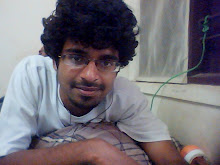On my return journey from Coimbatore, boredom hit me with full force. So I picked up my phone and started messaging my friend, Shailend Chand(Moon) who also has a wonderful blog running here: http://shailend-tabernacle.blogspot.in/ . The conversation that ensued left me engaged for quite some time and I decided to immortalize it on the labyrinths of the wide web once I reached hostel. Here it is:
Me: ...then anything interesting?
Him: Savour the night sky. Esp the crescent moon.
Me: Ah the crescent moon, such seductive beauty. Possessing her beholders with a bond ineffable by the mightiest of human hearts. Even such its darker side casts upon us every month. But the servility of man to beauty is clearly reflected as we fall mesmerized under her false whiteness in this neverending cycle of celestial magnanimity.
Him: Holy shit! Let me get a dictionary first..
Me: There are more to words than its meaning my friend. When the connection between words and human mind is made the ideas which flow don't need language to be understood.
Him: Still, man. cannot afford to sacrifice precision upon the altar of emotion.
Me: You see the notion of idea should not be obfuscated with more worldly things like emotion. Salvation lies inside ideas and you may have to sacrifice the tangible to truly embrace it.
Him: Ideas are worldly entities, as tangible as the reality they inhabit. Salvation lies beyond, in their absence.
Me: What its the beyond if not the idea of man to escape the truth. The curse of one's being lifted in the beyond is a supercilious idea put into man's head since the time Eve took the unholy bite. When there was nothing the idea of being was what succeeded.
Him:Existence is forced upon man. Truth cannot deliver him from this. Only the abyss can. Over and out.
